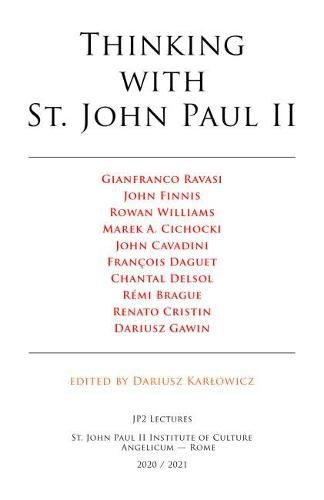Readings Newsletter
Become a Readings Member to make your shopping experience even easier.
Sign in or sign up for free!
You’re not far away from qualifying for FREE standard shipping within Australia
You’ve qualified for FREE standard shipping within Australia
The cart is loading…






The relevance of John Paul II’s thought is not limited to the period of his pontificate; it has much to say in considering contemporary problems that arise in the areas of faith, philosophy, culture, science, politics and a wide array of social issues. Therefore, it is not enough to examine the achievements of this great pontiff. We must also think with him about the most pressing issues of our day, including culture, solidarity, mercy, Christian art, justice, democracy, contemporary ideologies and movements, the place of the Church in the modern world, and the spiritual crisis facing Europe.
Thinking with St. John Paul II is a result of a series of monthly
JP2 Lectures
held in the academic year 2020/2021 at the Pontifical University of St. Thomas Aquinas-Angelicum in Rome. The ‘JP2 Lectures
have been introduced to the Angelicum’s curriculum by the St. John Paul II Institute of Culture as lectures open to the public and promoting reflection on a wide range of topics in the light of St. John Paul II’s intellectual and spiritual legacy. The authors of texts included in this volume are some of the most prominent intellectuals of our time from across the world/from Europe and the US.
The collection of the lecture-based essays begins with a text titled
Why Does Christianity Need Culture?
by Cardinal Gianfranco Ravasi, the President of the Vatican’s Pontifical Council for Culture. The lecture was originally held on October 19, 2020, in the Angelicum’s Aula Magna (Aula Giovanni Paolo II) as the academic year’s inaugural event. Further topics include questions relating to fundamentals of ethics, role of faith in the public sphere, political theology, meaning of art in modern Christianity, historical and ideological contexts pertaining to the past and current status of Christian culture, thought and lifestyle, and other important subjects. The common demonination of all the lectures is their reference to the teachings of St. John Paul II.
$9.00 standard shipping within Australia
FREE standard shipping within Australia for orders over $100.00
Express & International shipping calculated at checkout
The relevance of John Paul II’s thought is not limited to the period of his pontificate; it has much to say in considering contemporary problems that arise in the areas of faith, philosophy, culture, science, politics and a wide array of social issues. Therefore, it is not enough to examine the achievements of this great pontiff. We must also think with him about the most pressing issues of our day, including culture, solidarity, mercy, Christian art, justice, democracy, contemporary ideologies and movements, the place of the Church in the modern world, and the spiritual crisis facing Europe.
Thinking with St. John Paul II is a result of a series of monthly
JP2 Lectures
held in the academic year 2020/2021 at the Pontifical University of St. Thomas Aquinas-Angelicum in Rome. The ‘JP2 Lectures
have been introduced to the Angelicum’s curriculum by the St. John Paul II Institute of Culture as lectures open to the public and promoting reflection on a wide range of topics in the light of St. John Paul II’s intellectual and spiritual legacy. The authors of texts included in this volume are some of the most prominent intellectuals of our time from across the world/from Europe and the US.
The collection of the lecture-based essays begins with a text titled
Why Does Christianity Need Culture?
by Cardinal Gianfranco Ravasi, the President of the Vatican’s Pontifical Council for Culture. The lecture was originally held on October 19, 2020, in the Angelicum’s Aula Magna (Aula Giovanni Paolo II) as the academic year’s inaugural event. Further topics include questions relating to fundamentals of ethics, role of faith in the public sphere, political theology, meaning of art in modern Christianity, historical and ideological contexts pertaining to the past and current status of Christian culture, thought and lifestyle, and other important subjects. The common demonination of all the lectures is their reference to the teachings of St. John Paul II.